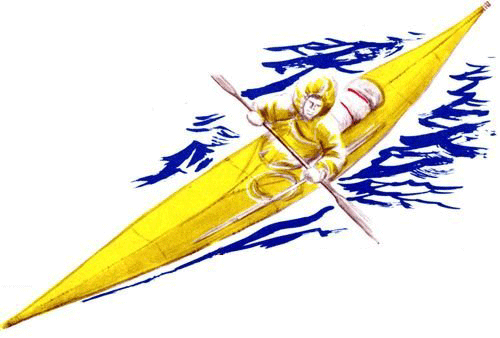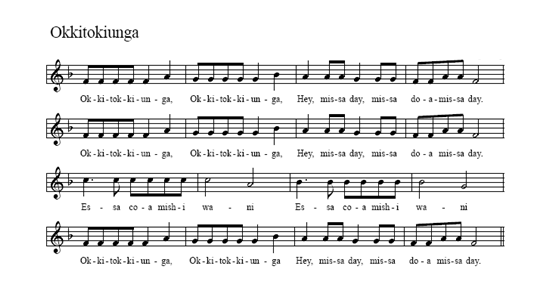Okki Tokki Unga
"Okki Tokki Unga" is sung across the English-speaking world by Girl Scouts, at camps and in schools.
Most people think this is an Inuit canoeing song. However, I contacted the Ottawa Inuit Children's Centre and no one there recognizes any of the words in this song. -Mama Lisa

Okki Tokki Unga
Okki Tokki Unga
Children's Song
Children's Song
(Unidentified Language)
(English)
1. Okki tokki unga, okki tokki unga,
Hey, missa day, missa doh, missa day.
Okki tokki unga, okki tokki unga,
Hey, missa day, missa doh, missa day.
2. Hexa cola misha woni
Hexa cola misha woni
Hexa cola misha woni
(Repeat Song)
Luke Pierce wrote:
"I have no idea if anyone has come forward, but when I was at school in England, we were taught this song was from Norway. Specifically the traditional tribes that live in the far North and have their own language.
Hopefully that helps?
Regards,
Luke"
If anyone can help confirm the origin of this song, its language or provide an English translation, please email me. Thanks! Mama Lisa
Notes
There's another version of this song called Atakata Nuva.
*****
I asked Lynda Brown from the Ottawa Inuit Children's Centre about this song and she wrote, "I have asked around and no one seems to recognize it, nor do they recognize any of the words- most commenters seemed to think it may be a First Nations song, especially if it's a song about canoes."
*****
I emailed Wendy Camber at Alaska Native Language Archive about this song and here's what she wrote:
"I talked to Dr. Larry Kaplan, Linguist, Inupiaq Language and he could not identify any Eskimo words in the song. He said: 'This is one of those garbled things that doesn't look like any language, even though it is reportedly this or that. It sure doesn't look like any Eskimo language. There's always the chance that it's some language badly written, but how to tell?'
I'm sorry we could not be any more helpful.
Wendy
PS. I remember that song well from Girl Scouts!"
*****
Mikaela wrote, "I don't know what language this is in but I sang it in music class when I was in grade three. My music teacher said that the first part was about looking for a seal to hunt and the second part was about riding back to shore with the seal. This might not be accurate but this is what I was told, hope this helps!"
*****
J.F. wrote: "I found this explanation on another link, perhaps it's from the west coast of Alaska, as it says here and Northwest Territories or even Nunavut.
'Inuit (Inuktitut syllabics, singular Inuk) is a general term for a group of culturally similar indigenous peoples inhabiting the Arctic coasts of Siberia, Alaska, the Northwest Territories, Nunavut, Quebec, Labrador, and Greenland. Until fairly recent times, there has been a remarkable homogeneity in the culture throughout this area, which traditionally relied on fish, sea mammals, and land animals for food, heat, light, clothing, tools, and shelter. Their language, sometimes incorrectly called Inuktitut, is grouped under Inuit language or Eskimo-Aleut languages.'
Hope this helps your search for the true meaning of the song."
*****
Tim wrote, "I was taught this song in the 6th Grade. Our teacher said it was an Eskimo song. The okki tokki portion was the Eskimo in his kayak paddling. We would all cross our arms and move them as though rowing a kayak with a double paddle and keep time with the lyrics.
The hexi cola part was the Eskimo looking for something. We would cup our hands on our brow and peer around as though searching for something in the distance""shielding our eyes from the sun. Then…back to the rowing part.
Other songs:
John Jacob Jingleheimer Schmidt
Do your ears hang low
That's what I learned at my school
You're a grand old flag.
Etc…
Back then, (in the 60's "" early 70's) innocence was held for children well into their teenage years, so nobody felt silly singing these songs in the 6th grade! The teacher would lead the class a capella. It was fantastic! Square dancing, singing and clean, innocent fun!
Tim"
*****
Game Instructions
1. Children sit on the floor and pretend to paddle a canoe.
2. Children "stop" rowing, put hand up at forehead and mime looking around.
Repeat the song and actions.
Comments
You can learn other versions of Okki Tokki Onga and share your version on Mama Lisa's World Blog.
If anyone can help identify the origin of this song and/or its language, please email me. Thanks! Mama Lisa

Many thanks to Nicki Bowden and Class 2 Balshaw Lane Primary School for the wonderful recording!

Thanks!
Thanks and Acknowledgements
Many thanks to Chrystal Woodard for contributing this song and the score.
Many thanks to Lynda Brown, Wendy Camber, Dr. Larry Kaplan and J.F. for trying to help us learn about the origin of this song. Thanks to Mikaela, Tim and Luke Pierce for writing in too!
Thank you!

























